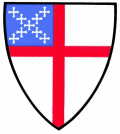Exactly Who is Peter J. Akinola?
Please read this analysis of the man who purports to speak for Anglicans in the United States. For a slightly different point of view, I also suggest that you read this report, as well.
By JOEY DiGUGLIELMO
Archbishop Peter Akinola, head of the Anglican Church in Africa, is considered by many to be a controversial, anti-gay figure. But who is he and are leaders of the Virginia churches now aligned with him downplaying Akinola’s gay views to make the religious leader more palatable to U.S. critics of the split?
Akinola has raised international eyebrows for his uber-conservative views of homosexuality. When the Church of England proposed ordaining a gay bishop, Akinola called it “an attack on the church of God — a Satanic attack on God’s church.”
And during the buildup to the Episcopal Church USA’s ordination of Gene Robinson, Akinola said, “I cannot think of how a man in his senses would be having a sexual relationship with another man. Even in the world of animals, dogs, cows, lions, we don’t hear of such things.”
He supports a proposed anti-gay bill in Nigeria that would make it illegal for gays to assemble publicly or to petition the government. The measure would also make it illegal to join gay organizations, read gay-themed literature, watch gay TV shows or films and visit gay web sites. The bill would even bar gays from dining together in restaurants. Homosexual sex is already illegal in Nigeria, punishable by jail in the south, which is predominantly Christian. In the mostly Muslim northern region, gay sex is punishable by death.
Akinola was ordained a priest in Abuja, the Nigerian capital, in 1979. He became a bishop in 1989 and an archbishop in 1997. He was made a primate of the Nigerian Anglican Church in 2000 and was named one of Time magazine’s “100 Most Influential Personalities of the World” this year. He also is chair of the 37 million-member Council of Anglican Provinces in Africa.
His harsh denunciation of all things gay is striking in its contrast to the views of Rev. Martyn Minns, the priest in charge of Truro Church in Virginia and a bishop now serving under Akinola through the Convocation of Anglicans in North America (CANA).
The big question, then, is why the U.S. churches disenchanted with the Episcopal Church USA would want to align with Akinola and his Nigerian branch of Anglicanism.
Philip Jenkins, a professor of history and religious studies at Pennsylvania State University, said it’s important to consider Akinola’s cultural context and church history.
Though Akinola’s anti-gay edicts may sound harsh to Western ears, Jenkins says they’re not unusual.
“The majority of African and even Asian bishops are pretty much on the same page with him on that,” Jenkins said. “They might disagree about a lot of other things, but on the issue of homosexuality, they’re very much in agreement.”
Apart from homosexuality, Akinola’s church appeals to disenchanted Episcopal churches for two basic reasons, Jenkins said: the astounding success of his evangelical efforts (which has tripled membership to about 18 million in Nigeria from the late 1970s until now) and the historical church ties the worldwide Anglican church claims.
Evangelical Christianity is certainly alive and well in America in various denominations but CANA is appealing because it claims its ancestry back to Christ’s apostles, something U.S. evangelical churches can’t do.
“They look at it as going from being on a dying branch to going back to the trunk,” Jenkins says of the disenchanted Episcopalians.
And while Minns couches his traditional biblical views on gays in gentler ways than Akinola, they essentially share the same theology, that homosexual sex is biblically forbidden and thus sinful.
Elizabeth Perry contributed to this report.






















0 Comments:
Post a Comment
<< Home